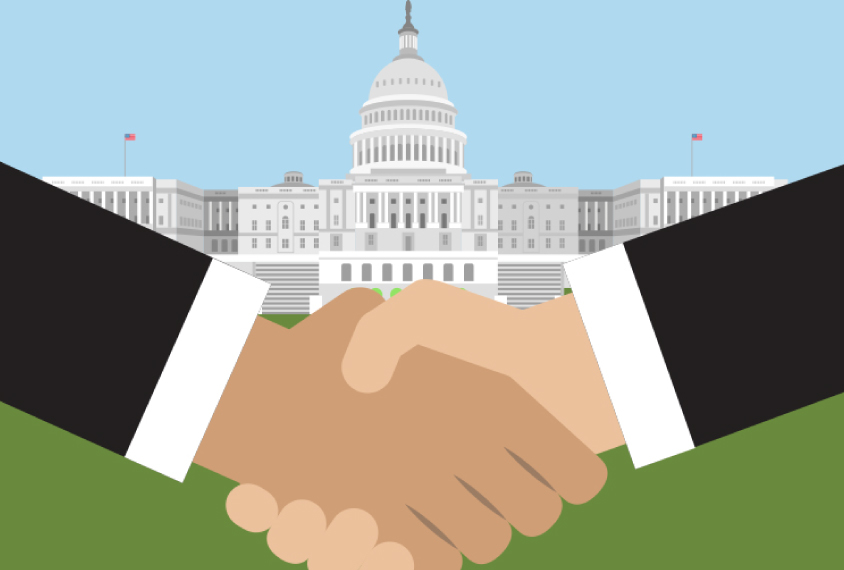Lobbying – the good, the bad and the ugly
Is there such a thing as “responsible lobbying”? Sure there is, but the act of lawfully attempting to influence something usually gets hurdled with the many examples of how corporations and interest groups have successfully managed to regulate government policies in their favor, regardless of how good or bad those policies were.
The good
When we usually talk about lobbying, we immediately think about companies such as Monsanto, Shell Global, ExxonMobil or General Electric, all of which have been involved in dubious scandals in the past. But that does not mean the act of lobbying is necessarily a bad thing. As a matter of fact, lobbying is an important lever for a productive government. Without it, governments would struggle to sort out the many, many competing interests of its citizens. Furthermore, lobbying provides access to government legislators and it allows individual interests to gain power in numbers.
Let’s take the US as an example: in 2019 alone, lobbyists spend $3.47 billion on influencing political lobby alone, representing the highest sum spend on lobbying since 2010. Lobby groups use political influence as a means to create productive legislation, and the act of lobbying in the United States pressures the government into specific public policy actions. Without it, the framework of the American participatory democracy would crumble. After all, the 1st Amendment clearly says that the people have “the right to petition the Government for a redress of grievances”.
“Lobbying has become a term of reproach, as if it were improper to push for a particular belief. This has happened because of paid lobbyists whose opinions are for hire and the fear that decision-makers, whether politicians or officials, are susceptible to their charms and wiles. This has tarred entirely proper lobbying with the same brush” – Jacob R. Mogg, British
The bad
That doesn’t mean, however, that lobbying is all good and dandy. It does have a dark side to it, especially now in the modern era democracies, where politicians can be directly influenced by lobby groups to regulate or deregulate important sectors of the market state, such as the financial sector. Sure, reducing regulations, lowering taxes, or passing legislation that makes sense for markets is definitely a good thing, but what happens when a lobby group pushes for actions that clearly helps their client to the detriment of other companies?
Let’s take a look at an example: in December 2012, a hedge fund used lobbying and public relations to pressure the US federal government to put a business into bankruptcy. In a span of just a few months, this activist investor managed to short the company to the tune of $1 billion, with its stock dropping 10% in six seconds and 42% over a week. All in all, the lobby group spent $50 million to “research and publicize the fund’s negative view on the company”, with a lot of that cash ending up in the pockets of various politicians in Washington, D.C., who successfully petitioned the Federal Trade Commission (FTC) to investigate the matter.
“After all, Wall Street is clearly the most powerful lobbying force on Capitol Holl. From 1998 through 2008, the financial sector spent over $5 billion in lobbying and campaign contributions to deregulate Wall Street” – Bernie Sanders, U.S. Senator
The ugly
But what about foreign political lobbying? Technically, it’s legal, but is it moral? While current law forbids foreign nations from contributing to federal, state, or local elections, loopholes allow American subsidiaries of foreign corporations to establish SSFs (separated segregated funds) to raise money. Foreign-funded lobbying efforts in the US include those of Israel, Saudi Arabia, Egypt, Pakistan, Libya, China, the UK and so forth. In the US alone, the general trend is that the number of lobbyists representing foreign companies is drastically rising.
But that’s also the case for US companies that lobby foreign states in countries all over the world. And that is where it gets tricky. Why? Because a lot of countries across the globe view the act of lobbying as “influence peddling”, which is illegal. But that does not stop the US companies from engaging in lobbying measures that often increase corruption in third world countries. Large sums of money are exchanged, often under the table, and various foreign companies benefit from the lack of strong judiciary organizations that could potentially prosecute them.
The case of Washington’s APCO Worldwide is well known – back in 1995, it represented the dictatorship of General Sani Abacha of Nigeria, whose regime had hanged pro-democracy activists. Nowadays, lobbying groups from the United States work in Africa or Europe, where they often represent politicians or political parties that have had their fair share of controversies in the past. Is it illegal? It might be, in those countries, but not in the United States. And especially not when the lobbying groups act as de facto “political advisors”.
“US or British companies used to carry a stigma in Africa. It suggested that [political] parties were out of touch, but with leaders like Obama and David Cameron hiring international advisers, there is less resistance” – Jonathan Lehrle, partner at Bell Pottinger, a political consultant company that got caught flaming a racial war in South Africa during the last presidential election.
So, what’s the conclusion? Is lobbying good, bad, or ugly? Well, it really depends on who’s sending the money, honestly. Sure, the act of lobbying can be good when the interests of the citizens are at stake. And yes, it can be bad when megacorporation’s abuse the system by bribing politicians to do their bidding. But it truly gets ugly when consultant firms use the cover of lobbying as an excuse to affect the democratic rule in countries across the globe, just to get their hands on money, resources, power or influence.










Trackbacks and Pingbacks